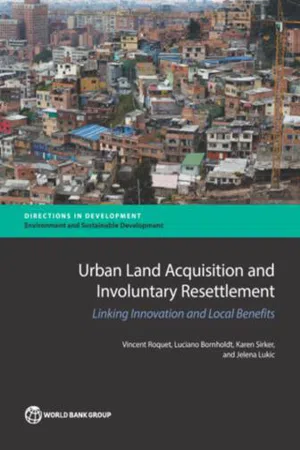
Urban Land Acquisition and Involuntary Resettlement
Linking Innovation and Local Benefits
- English
- PDF
- Available on iOS & Android
Urban Land Acquisition and Involuntary Resettlement
Linking Innovation and Local Benefits
About This Book
Expansion and development of urban areas require acquisition of land, which, in turn, often requires physical relocation of people who own or occupy this land. Land acquisition and resettlement may also be required to improve the lives of the more than 1 billion people who currently live in slums around the world, most of them in developing countries. Therefore, any effort to embark on significant, sustainable urban development needs to ensure that there are adequate processes for land acquisition and, so that resettlement does not become a constraint to much needed urban development. Planners, policy makers and social scientists can try to implement urban development programs in a way that make people who lose their land, houses or livelihoods become equal partners in the development process. The combination of the high price of urban land, presence of creative individuals in close proximity in urban areas, and the ability of urban space to generate innovative solutions, can help convert urban resettlement into a development opportunity for all. The report illustrates how urban resettlement can become a development opportunity. The Mumbai example shows how the private sector can play a key role, to unleash the potential created by high-value land to provide sustainable housing solutions to those adversely affected, at no cost to the government or the resettlers. Examples from Morocco and Pakistan show how well designed and implemented, citizen-driven resettlement can result in enhanced skills and livelihoods, and can promote overall sustainable urban development. The Mauritania example demonstrates how collective approaches with strong community participation can help address difficult challenges related to housing. The Brazil case shows how resettlement practices with demonstrated, strongly positive outcomes and contributions to urban development can influence governments to incorporate them into their own laws and regulations, helping millions of affected people to benefit from them.
Frequently asked questions
Information
Table of contents
- Front Cover
- Contents
- Foreword
- Acknowledgments
- About the Authors
- Glossary
- Abbreviations
- Overview
- Chapter 1 Introduction
- Chapter 2 Innovative Country Systems: Example from Brazil
- Chapter 3 Relocation of Informal Urban Settlements: Examples from India and Mauritania
- Chapter 4 Livelihood Restoration for Informal Urban Occupations: Examples from Morocco and Pakistan
- Chapter 5 Conclusions and Recommendations
- Boxes
- Maps
- Photos
- Table